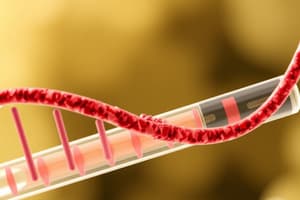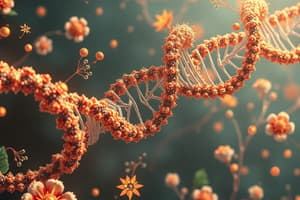Podcast
Questions and Answers
What enzymatic activity does DNA ligase have in molecular cloning?
What enzymatic activity does DNA ligase have in molecular cloning?
- Exonuclease activity to degrade DNA strands
- Ligase activity to join DNA fragments (correct)
- Polymerase activity to synthesize new DNA strands
- Helicase activity to unwind DNA strands
Why does recombinant DNA work, even though humans are very different than bacteria?
Why does recombinant DNA work, even though humans are very different than bacteria?
- Due to the ability of bacteria to recognize and replicate foreign DNA
- As bacteria have the ability to modify their genetic makeup to accommodate foreign DNA
- Because the genetic code is universal and can be read by all organisms (correct)
- Because humans and bacteria share a high degree of genetic similarity
What components of the replication fork are not present in PCR, and why are they not needed?
What components of the replication fork are not present in PCR, and why are they not needed?
- Single-strand binding proteins, because PCR amplifies specific DNA regions
- Primase, because PCR uses synthetic primers for DNA synthesis
- Helicase, because PCR uses heat to denature DNA strands (correct)
- DNA polymerase, because PCR uses a different enzyme for DNA synthesis
In gel electrophoresis, in which direction does DNA run?
In gel electrophoresis, in which direction does DNA run?
What enzyme is used in PCR?
What enzyme is used in PCR?
Why does recombinant DNA work, even though humans are very different than bacteria?
Why does recombinant DNA work, even though humans are very different than bacteria?
What enzymatic activity does DNA ligase have in molecular cloning?
What enzymatic activity does DNA ligase have in molecular cloning?
What components of the replication fork are not present in PCR, and why are they not needed?
What components of the replication fork are not present in PCR, and why are they not needed?
Why does recombinant DNA work, even though humans are very different than bacteria?
Why does recombinant DNA work, even though humans are very different than bacteria?
What enzyme is used in PCR?
What enzyme is used in PCR?
Flashcards are hidden until you start studying
Study Notes
Molecular Cloning
- DNA ligase has the enzymatic activity of forming a covalent bond between two DNA molecules, essential for molecular cloning.
Recombinant DNA
- Recombinant DNA works despite the differences between humans and bacteria because it relies on the universal genetic code, which allows genetic information to be translated into proteins across species.
Replication Fork and PCR
- The components of the replication fork not present in PCR are helicase, primase, and ligase, which are responsible for unwinding, priming, and sealing the DNA, respectively.
- These components are not needed in PCR because the process uses primers and DNA polymerase to amplify specific DNA sequences.
Gel Electrophoresis
- DNA runs from negative to positive electrodes in gel electrophoresis, allowing for the separation of DNA fragments based on their size and charge.
PCR
- The enzyme used in PCR is DNA polymerase, which synthesizes new DNA strands by adding nucleotides to a primer sequence.
Note: I removed duplicate questions and organized the answers into relevant topics for better clarity and understanding.
Studying That Suits You
Use AI to generate personalized quizzes and flashcards to suit your learning preferences.




